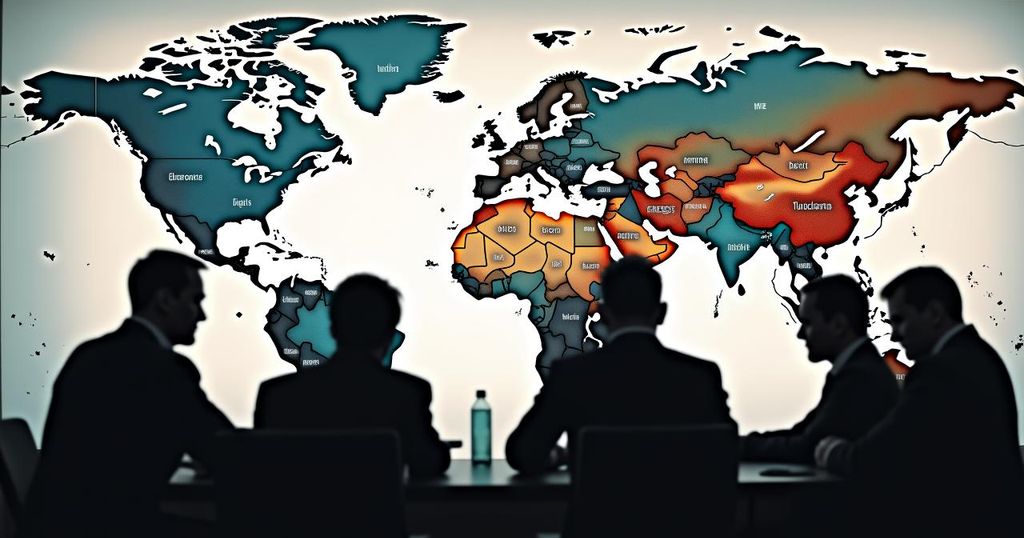In a recent UN address, Israeli Prime Minister Benjamin Netanyahu showcased two maps representing Middle Eastern nations, highlighting the strategic alliances Israel is pursuing while notably omitting Palestine from both representations. He emphasized the threats posed by Iran, urging collaboration with allied nations like Egypt, Sudan, Saudi Arabia, and India, amidst ongoing tensions in the region.
At the United Nations General Assembly, Israeli Prime Minister Benjamin Netanyahu presented two maps, effectively highlighting a perspective on Middle Eastern geopolitics. One map, labeled “The Curse,” depicted Iran and several other countries such as Iraq, Syria, and Yemen in black, while the other, titled “The Blessing,” showcased nations including Egypt, Sudan, Saudi Arabia, and India in green. Notably, both maps conspicuously omitted any indication of Palestine’s existence. Netanyahu’s discourse drew a connection between the black marked nations and the influence of Iran, suggesting that Iranian engagement was a primary instigator of regional conflict. He attributed ongoing violence in Lebanon, Syria, and Yemen to Iran’s support for militant groups like Hezbollah in Lebanon and Hamas in Gaza. Netanyahu asserted that Israel is compelled to defend itself from threats posed by Iranian-backed entities, emphasizing the seriousness of the situation. During his address, he leveled threats towards Iran, stating, “If you strike us, we will strike you,” not ruling out the possibility of extending military actions throughout the region as deemed necessary. His speech sparked notable dissent, prompting an exodus of diplomats from the assembly. Furthermore, his maps reflected Israel’s alliances and relationships with countries in the green zone, particularly highlighting the complex position of Saudi Arabia. Prior to the recent escalations in the Israel-Hamas conflict, the Biden administration had initiated discussions to broker a normalization agreement between Israel and Saudi Arabia; however, this endeavor faced complications as Saudi leadership maintains that progress towards normalization contingent on the establishment of a Palestinian state. Egypt’s representation in the “blessing” map is unsurprising, given its history of a peace treaty with Israel since 1979, despite ongoing tensions. Both countries have engaged in cooperation, especially concerning security and energy, though Egypt does not openly support Israeli military actions. Sudan’s presence in the green zone indicates a significant shift following its signing of the Abraham Accords, aimed at fostering diplomatic relations with Israel. This collaboration has been viewed as a strategic move to align with the U.S. and counter Islamist movements. Finally, India’s inclusion in the green map underscores its growing partnership with Israel, especially since Prime Minister Modi’s administration has sought to deepen defense and technological ties while navigating its historical support for Palestinian self-determination.
The recent remarks by Israeli Prime Minister Netanyahu at the United Nations highlight the complex dynamics in Middle Eastern geopolitics, particularly regarding alliances and conflicts. The omission of Palestine from the maps presented during his speech emphasizes Israel’s stance and narrative concerning regional security and Iran’s influence. The discussion around normalization agreements with nations like Saudi Arabia and the evolving relationships with Egypt, Sudan, and India shows a shifting landscape in diplomatic ties in the region, influenced by broader strategic interests.
Netanyahu’s presentation at the UN illustrates Israel’s approach to regional security, particularly its stance against Iranian influence and its efforts to consolidate partnerships with several Middle Eastern countries. The complete absence of Palestine in his maps signals a contentious political narrative regarding the Israeli-Palestinian conflict. As the region continues to face turmoil, the balance of alliances and the potential for diplomatic normalization remain pivotal challenges.
Original Source: www.ndtv.com






